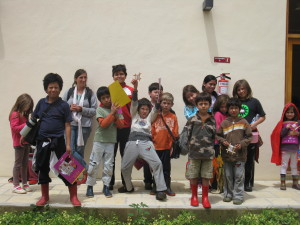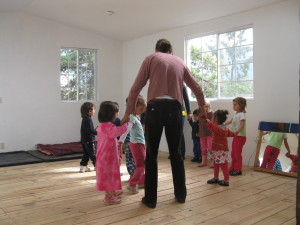This post is a follow-up to one I (Jacquie) wrote in April – It´s All About Love –  it continues a series of blogs on explaining more about the philisophy and life of Yirtrak, the organization I volunteer at here in San Cristobal.
 Libertad – The Basic Idea
“Libertad” – a spanish word, which while obviously related to the idea of liberty, is perhaps better translated freedom. It is also one of Yitrak´s fundamental philosophies.  I am still in the process of understanding what is meant by this word, at least in my current cultural context (of the organization I mean, and yes to some extent Mexico), but still I feel up to trying to explain how this idea of “Libertad” is lived out in the various educational projects of Yitrak.  Considering this words close connection to the idea of liberty and the fairly fluid, lets just say “hippy” influenced culture that I often find in Yirtrak, it was initially hard to not wonder if this quest for Libertad stemmed from the desire to have the freedom to do whatever one wants,  without thinking of others. But no, I was misled, there is another spanish word that speaks to this type of attitude – libertinaje (in English liscentiousness?), although perhaps reminding ourselves regularily of the difference of these two simliar words is an important exercise.
Here is a summary of Yirtrak´s philosophy of Libertad, a.k.a. Freedom.
Its an education in and for freedom, and refers to the idea of accompanying the growth of childen within their own personal natural development, respecting their desires, interests and affinitys, while also taking into considering some basic principles of living in harmonia with one´s community.
The description goes on to focus on the need to be responsible for one´s owns actions and the consequences they have for oneself and others, and also of the importance of knowing one´s owns limits for the well being of oneself and others.  The goal of such an education  is to develpment independent and autonomous persons that can be “change agents” in the social/cultural context they find themselves in.
A Bit of Contextual Background
Yikes, now that I type that out in English I realize the depth of that philosophy and the loftiness of trying to achieve it.  So yes, there is the potential to critique both this concept in general or how well this organizaton is reaching its goal, but I don´t think that will be my point in writing. Instead, I´d like to share some specific examples of how this principle is being lived out in the educational projects of the organization. First, I´d like to clarify that we are living in Mexico, which has a diverse and beautiful culture.
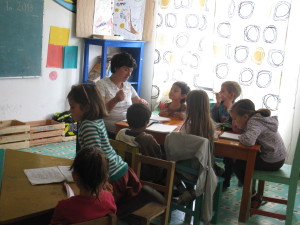
Yet, historically and to the present time, the structure and culture of the public school system does not overly promote a diverse or child focused development, and is very standardized.  For example, children where uniforms, national wide circulum and materials are provided for each subject, regular exams begin in the first grade, and state-wide testing in the fourth grade.  Furthermore, from what I understand this type of education encourages people to memorize and perhaps understand things but not provide tools how to think, analyze or problem solve for oneself. Finally cultural expectations and salaries, make it hard for teachers to bring much creativity to their students. That´s not to say there are not many dedicated, good teachers…I know, because I know some. But these are many of the reasons that Yirtrak, its schools proyects, teachers and the families involved are looking for and wanting to offer a different style of education.
Putting the Theroy in Practice
One clear example of this type of education “in and for freedom” is the level of input that students have in the life of their school and in to some extent in what they want to study.
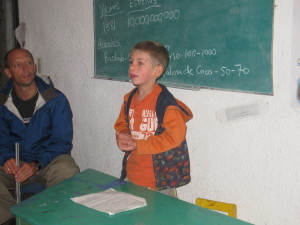
One specific example is the use of projects and “conferencias,” which means that  as parents we are encouraged to have an on-going project that we work at home with our child. They are allowed to pick whatever theme they would like (sometimes within a general topic, ie. animals) and we are given some age appropiate guidelines in how to help the child research the topic and prepare a presentation for his/her class (aka a “conferencia”).  Last year Ezra chose a number of different topics including – hamsters, How to make a Video, Killer Whales and The Mayas, which allowed him to learn a variety of things while also praciticing his research, writing and public communication skills.
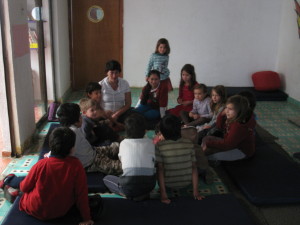
Another example is the weekly student asamblea. It is a space for the kids to discuss issues going on in the school, to share their opinions or feelings and to hear from others and try to offer solutions to conflicts. While guided by the teachers (or the word they use more is acompañantes) it clearly is student orientated. While the preschool does not host asambleas they do highly value children´s input and encourage and teach them in basic principles in resolving conflicts or being respecful and peaceful with others.
In both Hilary´s preschool and in Ezra´s primary school this focus on Libertad is also evident in the personal care that each child receives, the high “teacher” to child ratio (on average about 8 to 1) and focus on holistic education allows the adults to really understand and help each child to mature in all dimensions of life  – cognitive, emotionally, socially, personally, etc.- with love and acceptance being the basis for appreciating each child`s differences.  Parent/teacher interviews are more focused on the holsitic development of the child rather than talking about grades or academic acheivements.
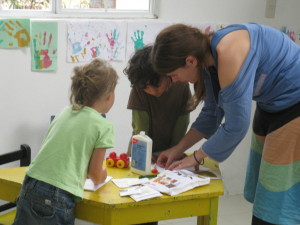 Finally,  I just wanted to mention that another elemenent that we really appreciate is how gender equality is encouraged and supported, whether that be through developing the emotional aspect of all the children, the high level of cross gender friendships or encouraging and giving equal opportunities to boys and girls to be involved in a wide spectrum of activities – bascially, the school´s try to free kids from fairly restricted gender/culture norms or expectations  (and remember we are living in Mexico!).
Finally,  I just wanted to mention that another elemenent that we really appreciate is how gender equality is encouraged and supported, whether that be through developing the emotional aspect of all the children, the high level of cross gender friendships or encouraging and giving equal opportunities to boys and girls to be involved in a wide spectrum of activities – bascially, the school´s try to free kids from fairly restricted gender/culture norms or expectations  (and remember we are living in Mexico!).
And to End things Off…
While every organization or projects has its weaknesses, Yitrak definitely encourages and educates its students and workers to be themselves, while appreciating each persons differences.  It inspires creativity, promotes interest in learning, self confidence in sharing one´s emotions and opinions, and aims to teach good principles about living peacefully in a diverse community.

